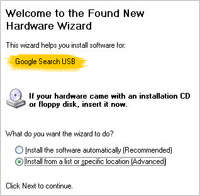 That Google is dominating the search industry is not exactly news. According to Nielsen/Netratings there were approximately 3 billion searches made in the U.S. on google.com in December 2006.
That Google is dominating the search industry is not exactly news. According to Nielsen/Netratings there were approximately 3 billion searches made in the U.S. on google.com in December 2006.
Though traffic estimates should always be taken with a grain of salt, we decided to make some simplified calculations based on this to see how much bandwidth the Google Search page is using. Just for fun. First we calculated the size of an average Google Search results page, and added it to the size of the google.com start page. Together they make up the data delivered by Google for one search query on their homepage, which turns out to be 39891 bytes.
If we simply take this number and multiply it with the Nielsen/Netratings number, we get 121,093,797,747,000 bytes, or just over 110 terabytes of data delivered by searches on google.com in the U.S. in December 2006. That translates to more than 3.5 terabytes a day.
So how much bandwidth is needed for that? Crunching the numbers reveals that a sustained 362 Mbit/s would be enough. That can be compared with a regular high-speed USB connection which has a theoretical throughput of 480 Mbit/s. Imagine that, running the entire U.S. Google Search over USB…
Please note that this is a very simplified calculation. We have not taken any caching, TCP/IP packet overhead or POST data into account. We have also ignored the fact that some queries are made directly on the search results page, all to simplify the calculations.
However, simplified calculations aside, it’s interesting that the bandwidth number isn’t higher, and it certainly shouldn’t pose a problem for a company with Google’s resources. The conclusion would be that the big resource hog for Google Search is backend processing, not bandwidth.
Side note
This bandwidth is for searches made in the U.S. on Google.com. Google delivers a lot more search results via embedded search functionality in websites, toolbars, and so on, not to mention the rest of the world and all the data the Googlebot pulls in as it spiders the Web. The actual bandwidth for all Google Search activity is most likely several magnitudes higher than the number we arrived at in this article. Add to that the different services such as Gmail, Orkut, Blogger, Google Video, YouTube, etc, and bandwidth demands should go through the roof. It still stands, however, that for the Google Search page alone, bandwidth isn’t the main resource problem.



























